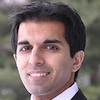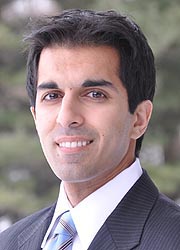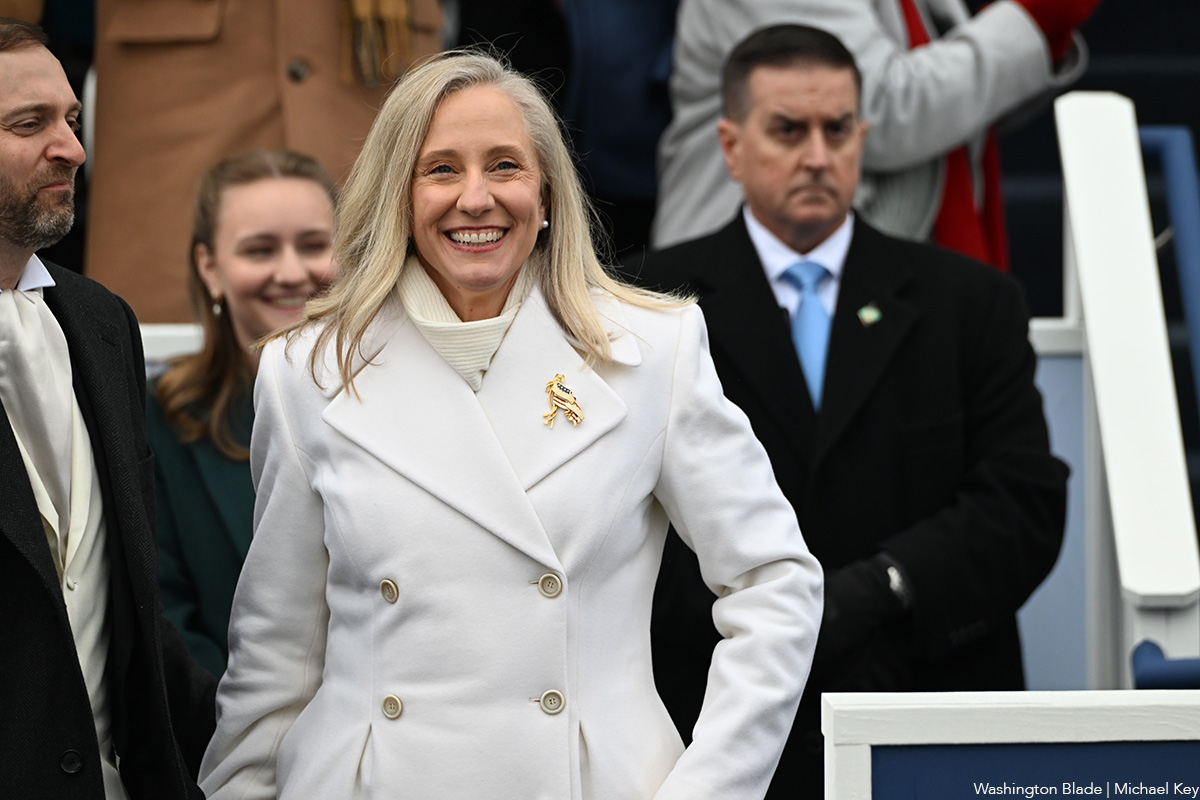Local
Disbelief, backlash after vote against marriage
Colleagues, former friends denounce Md. Del. Arora; aide resigns in protest


Del. Sam Arora changed his mind on the marriage bill, which he once sponsored, and voted against it last week. (Courtesy photo)
Maryland Del. Sam Arora’s decision to vote against the same-sex marriage bill last week proved unpopular with many in his progressive Montgomery County district, but no one was more disappointed than Arora’s own state senator, Roger Manno.
Sen. Manno (D-District 19), in a lengthy interview with the Blade, recalled his ultimately unsuccessful efforts to persuade Arora to support the bill, stretching back to last year.
“It’s a very tough situation,” Manno said. “I’m extremely concerned and disappointed and have spoken to constituents who are confused and concerned. I’m so … deeply disappointed and sad that Sam could not get there for whatever reason.”
Manno said he began meeting regularly with Arora shortly after he was elected in 2010 and heard that the freshman delegate was struggling with the marriage issue. Arora had campaigned on a pledge of support for the bill and even co-sponsored it initially before changing his mind last year.
“I could sense there could be a problem,” Manno said. “And I tried to mentor him. Freshmen make mistakes here and it’s easy to do things that are damaging to your career and that hurt people.”
So Manno and several other members of the Montgomery County delegation to Annapolis tried “to get him to see the issue as we saw it.”
“In my heart, marriage equality is an important and timely issue of emancipation for loving families who happen to be of the same sex,” Manno said.
After the marriage bill died in the House last year and the session ended, Manno said Arora took time off to study for the bar exam. Then last summer the two colleagues met again to discuss marriage.
“We sat for several hours and talked about his thoughts on marriage equality and where he was on the bill and he represented it was a crisis of faith,” Manno said.
At that point, Arora expressed a range of concerns about the bill, Manno said, including religious, moral and constitutional objections. Still, Manno urged Arora to keep an open mind because he knew that Gov. Martin O’Malley was planning to introduce the marriage bill in 2012. In late summer, Manno asked Arora to join him at a press conference where O’Malley announced his plans for the marriage bill, but Arora failed to show up.
When the 2012 session started last month, Manno said he continued to reach out to Arora, culminating with an hour-long meeting last week before a joint committee vote on the marriage bill; Arora serves on the Judiciary Committee, which was considering the measure.
“I didn’t know where he was going to go that week,” Manno said. Arora ultimately abstained from voting in committee at which point, “I put my head in my hands and said, ‘oh no,’” Manno said. After the committee sent the bill to the House floor, Arora received multiple calls from senior Democrats seeking his support, including O’Malley and former President Bill Clinton.
“When he went to the floor, I was there in the House chamber to give him a hug and let him know he had my support to vote for equality,” Manno said. “The vote came Friday, I was on the floor, I sent him a text a minute before the vote. I believed at the end of the day he would put a green vote on the board and he didn’t. The chamber erupted in jubilation, rightfully so, but I was standing on the floor with my head hung because Sam had disappointed a lot of people.”
Arora has yet to publicly disclose his reasons for opposing the bill after once sponsoring it. He has refused repeated interview requests from the Blade and other media outlets since last year.
Joshua Lapidus, Arora’s legislative director, quit in protest Friday night just after the marriage vote in a scathing resignation letter obtained by the Blade.
“I respect you and your beliefs, however I cannot respect your decision to place personal religious belief over the roles and responsibilities of the stewardship the people of District 19 entrusted unto you,” Lapidus wrote. He added, “It saddens me that you are standing against the tide of history and ending your career over an issue that will no doubt be decided in the affirmative, with or without your vote, over the next couple years. So, I write this letter to inform you that if you vote don’t vote for HB 438 l can no longer work under your employ.”
Arora issued a brief statement to the Blade in response to Lapidus’s resignation.
“I don’t comment on personnel issues,” Arora wrote. “That said: Josh continues to be a friend, and I wish him well.”
Another one-time friend of Arora’s, columnist and Democratic strategist Karl Frisch, praised Lapidus for stepping down.
“I think it’s gutsy,” Frisch said. “It’s the right move and shows that we had allies working on our behalf in his office.”
Frisch, a D.C. resident, donated $100 to Arora’s campaign in 2010 and said he knew Arora socially for several years. But after rumors emerged that Arora’s marriage position was changing, Frisch said his calls and emails went unreturned.
“I feel personally betrayed,” Frisch said. “I don’t take candidates’ word for it — he was listed as a co-sponsor of the bill and filled out an Equality Maryland questionnaire [on marriage]. … I’m used to politicians lying, I’m not used to being lied to by a friend.”
After Friday’s vote, Frisch said he took part in a conference call with a group of “national and Maryland-based political operatives to discuss every tool we can deploy to send Sam packing in 2014.” Manno said he wasn’t on that call but noted that politicians have to answer to their constituents.
“A former boss of mine once said that politics is about loyalty — to people, ideas, communities. At the end of the day, that’s really what we do,” Manno said. “Politicians have to answer for what we do in the next election and we all have to answer for what we do in the next life and I try to keep that in the forefront of my thoughts everyday.”
Manno, 45, is straight and married but credits his upbringing in the diverse and gay-friendly neighborhoods of Chelsea and Greenwich Village in New York for influencing his views on marriage. He once interned in the Clinton White House for Richard Socarides, who advised Clinton on gay-related issues.
“Marriage is a terribly uncomplicated issue,” he said. “If you love people and want to see that spark ignite, you have to love everyone.”
District of Columbia
Capital Stonewall Democrats elect new leaders
LGBTQ political group set to celebrate 50th anniversary

Longtime Democratic Party activists Stevie McCarty and Brad Howard won election last week as president and vice president for administration for the Capital Stonewall Democrats, D.C.’s largest local LGBTQ political organization.
In a Feb. 24 announcement, the group said McCarty and Howard, both of whom are elected DC Advisory Neighborhood Commissioners, ran in a special Capital Stonewall Democrats election to fill the two leadership positions that became vacant when the officers they replaced resigned.
Outgoing President Howard Garrett, who McCarty has replaced, told the Washington Blade he resigned after taking on a new position as chair of the city’s Ward 1 Democratic Committee. The Capital Stonewall Democrats announcement didn’t say who Howard replaced as vice president for administration.
The group’s website shows its other officers include Elizabeth Mitchell as Vice President for Legislative and Political Affairs, and Monica Nemeth as Treasurer. The officer position of secretary is vacant, the website shows.
“As we look toward 2026, the stakes for D.C. and for LGBTQ+ communities have never been clearer,” the group’s statement announcing McCarty and Howard’s election says. “Our 50th anniversary celebration on March 20 and the launch of our D.C. LGBTQ+ Voter’s Guide mark the beginning of a major year for endorsements, organizing, and coalition building,” the statement says.
McCarty said among the organization’s major endeavors will be holding virtual endorsement forums where candidates running for D.C. mayor and the Council will appear and seek the group’s endorsement.
Founded in 1976 as the Gertrude Stein Democratic Club, the organization’s members voted in 2021 to change its name to Capital Stonewall Democrats. McCarty said the 50th anniversary celebration on March 20, in which D.C. Mayor Muriel Bowser and members of the D.C. Council are expected to attend, will be held at the PEPCO Gallery meeting center at 702 8th St., N.W.
Virginia
Va. activists preparing campaign in support of repealing marriage amendment
Referendum about ‘dignity and equal protection under the law’

Virginia voters in November will vote on whether to repeal their state’s constitutional amendment that defines marriage as between a man and a woman.
Democratic Gov. Abigail Spanberger on Feb. 6 signed House Bill 612 into law. It facilitates a referendum for voters to approve the repeal of the 2006 Marshall-Newman Amendment. Although the U.S. Supreme Court’s Obergefell ruling extended marriage rights to same-sex couples across the country in 2014, codifying marriage equality in Virginia’s constitution would protect it in the state in case the decision is overturned.
Maryland voters in 2012 approved Question 6, which upheld the state’s marriage equality law, by a 52-48 percent margin. Same-sex marriage became legal in Maryland on Jan. 1, 2013.
LGBTQ advocacy groups and organizations that oppose marriage equality mounted political campaigns ahead of the referendum.

Equality Virginia has been involved in advancing LGBTQ rights in Virginia since 1989.
Equality Virginia is working under its 501c3 designation in conjunction with Equality Virginia Advocates, which operates under a 501c4 designation, to plan campaigns in support of repealing the Marshall-Newman Amendment.
The two main campaigns on which Equality Virginia will be focused are education and voter mobilization. Reed Williams, the group’s director of digital engagement and narrative, spoke with the Washington Blade about Equality Virginia’s plans ahead of the referendum.
Williams said an organization for a “statewide public education campaign” is currently underway. Williams told the Blade its goal will be “to ensure voters understand what this amendment does and why updating Virginia’s constitution matters for families across the commonwealth.”
The organization is also working on a “robust media and voter mobilization campaign to identify and turn out voters” to repeal Marshall-Newman Amendment. Equality Virginia plans to work with the community members to guarantee voters are getting clear and accurate information regarding the meaning of this vote and its effect on the Virginia LGBTQ community.
“We believe Virginia voters are ready to bring our constitution in line with both the law and the values of fairness and freedom that define our commonwealth,” said Equality Virginia Executive Director Narissa Rahaman. “This referendum is about ensuring loving, committed couples and their families are treated with dignity and equal protection under the law.”
The Human Rights Campaign has also worked closely with Equality Virginia.
“It’s time to get rid of outdated, unconstitutional language and ensure that same sex couples are protected in Virginia,” HRC President Kelley Robinson told the Blade in a statement.
District of Columbia
D.C. police arrest man for burglary at gay bar Spark Social House
Suspect ID’d from images captured by Spark Social House security cameras

D.C. police on Feb. 18 arrested a 63-year-old man “of no fixed address” for allegedly stealing cash from the registers at the gay bar Spark Social House after unlawfully entering the bar at 2009 14th St., N.W., around 12:04 a.m. after it had closed for business, according to a police incident report.
“Later that day officers canvassing for the suspect located him nearby,” a separate police statement says. “63-year-old Tony Jones of no fixed address was arrested and charged with Burglary II,” the statement says.
The police incident report states that the bar’s owner, Nick Tsusaki, told police investigators that the bar’s security cameras captured the image of a man who has frequently visited the bar and was believed to be homeless.
“Once inside, the defendant was observed via the establishment’s security cameras opening the cash register, removing U.S. currency, and placing the currency into the left front pocket of his jacket,” the report says.
Tsusaki told the Washington Blade that he and Spark’s employees have allowed Jones to enter the bar many times since it opened last year to use the bathroom in a gesture of compassion knowing he was homeless. Tsusaki said he is not aware of Jones ever having purchased anything during his visits.
According to Tsusaki, Spark closed for business at around 10:30 p.m. on the night of the incident at which time an employee did not properly lock the front entrance door. He said no employees or customers were present when the security cameras show Jones entering Spark through the front door around 12:04 a.m.
Tsusaki said the security camera images show Jones had been inside Spark for about three hours on the night of the burglary and show him taking cash out of two cash registers. He took a total of $300, Tsusaki said.
When Tsusaki and Spark employees arrived at the bar later in the day and discovered the cash was missing from the registers they immediately called police, Tsusaki told the Blade. Knowing that Jones often hung out along the 2000 block of 14th Street where Spark is located, Tsusaki said he went outside to look for him and saw him across the street and pointed Jones out to police, who then placed him under arrest.
A police arrest affidavit filed in court states that at the time they arrested him police found the stolen cash inside the pocket of the jacket Jones was wearing. It says after taking him into police custody officers found a powdered substance in a Ziploc bag also in Jones’s possession that tested positive for cocaine, resulting in him being charged with cocaine possession in addition to the burglary charge.
D.C. Superior Court records show a judge ordered Jones held in preventive detention at a Feb. 19 presentment hearing. The judge then scheduled a preliminary hearing for the case on Feb. 20, the outcome of which couldn’t immediately be obtained.




















